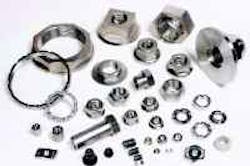Thread form tightens truck manufacturing
Domestic and international diesel-powered vehicle manufacturers such as Mack Trucks, Caterpillar, Shanghai Diesel Engine, and International Truck and Engine combat extreme engine temperature and vibration, while minimizing thread loosening, assembly, and service costs, using Spiralock's special internal thread form.
Spiralock's thread design incorporates a 30° wedge ramp cut at the roots of female threads instead of traditional 60° V-threads.
Domestic and international diesel-powered-vehicle manufacturers such as Mack Trucks Inc. in Allentown, Pa., Peoria, Ill.-based Caterpillar, Shanghai Diesel Engine in China, and International Truck and Engine Corp. of Warrenville, Ill., are combating extreme engine temperature and vibration, while minimizing thread loosening, assembly, and service costs, using a special internal-thread form. For these companies, engine performance, reliability, and meeting emission standards rides on joint integrity in critical areas like turbocharger mounts, exhaust-manifold joints and attachments, and where heat and vibration weaken and shake loose standard fasteners.
The special thread design, from Spiralock Corp., has a 30° wedge ramp cut at the root of the female thread instead of the traditional 60° V-thread design. Under clamp load, standard male-bolt thread crests draw tightly against Spiralock's wedge ramp.
As a mechanical solution to the loosening problem, the Spiralock thread form reportedly tolerates cyclic temperature changes better than traditional threads using nylon or adhesives. It also allows for both thermal expansion and contraction without slippage.
Spiralock's 30° wedge ramp not only eliminates sideways motion that causes vibrational loosening but also distributes the threaded joint's load among all engaged threads. In studies, the load percentage on Spiralock's first engaged thread was low, which further reduces bolt failure and improves product performance. Bolts in the Spiralock thread form spin freely until clamped to a final torque-retaining position to eliminate galling in assembly and needed service repair.
"After their adoption, none have failed in the field to my knowledge," states Todd Werner, a design engineer at Mack. "They're not only self-locking but also reusable during service without damage to the nut or stud. Mack uses Spiralock fasteners on the turbocharger mounts for its vocational truck line and on the ERG-valve mounts of its highway-truck line."
According to Sam Sutthiwan of Caterpillar, Spiralock fasteners stay put under engine vibration and withstand high temperatures. Jessie Zhang, a senior engineer at Shanghai Diesel, agrees and adds that the thread form protects bolt threads and clamped assemblies from damage during assembly or service.
For International, Spiralock fasteners solve a joint-integrity problem, prevent assembly issues with prevailing-torque-style fasteners, and improve assembly production. "Since the fasteners spin freely until tightening them, they tighten quicker than resistance-heavy locking methods such as prevailing torque nuts," says Gary Svidron a design engineer at International.
Spiralock Corp.
Madison Heights, Mich.
spiralock.com
